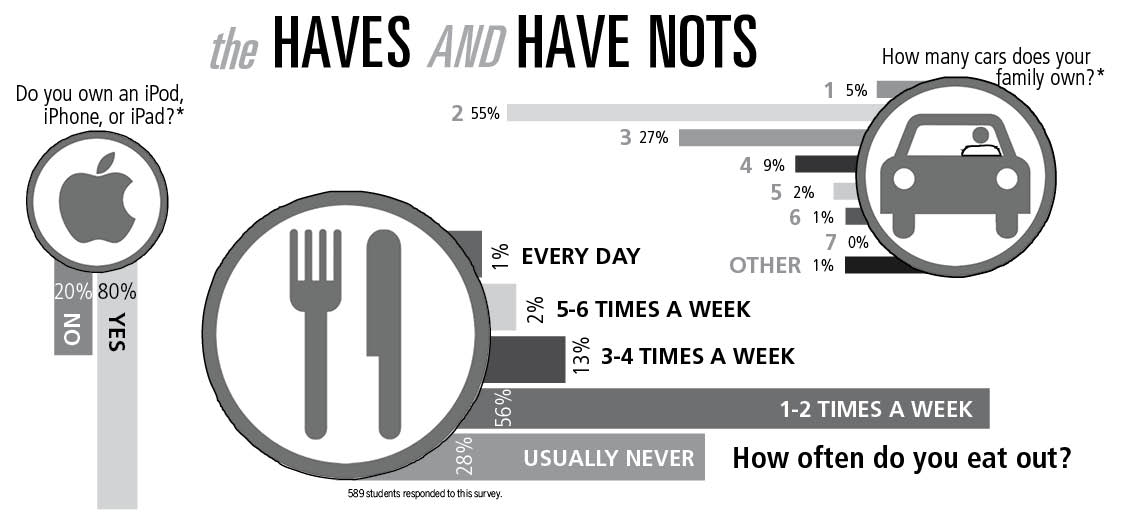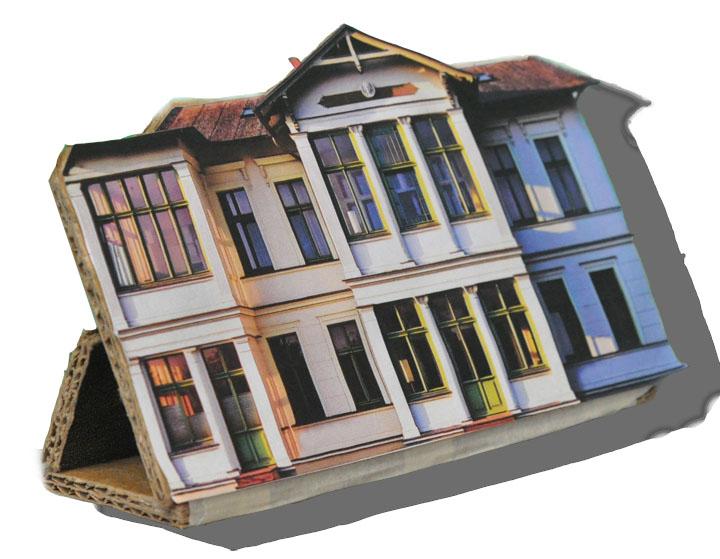In a report from The Atlantic Cities on Oct. 31, Cupertino lands in the list of where the upper 1% of the American social strata lives, earning its place among well-to-do locales such as New York City’s Upper East Side, Chicago’s Lincoln Park, and the northern suburbs of San Diego. Cupertino boasts familial median income levels in excess of $140,000, according to the 2005-2007 American Community Survey of the U.S. Census Bureau, and home prices in Cupertino average at about $1.04 million.
However, these are no more than names derived from numbers. And though numbers do not lie, they can be misleading.
Not the 1%
Senior Marcus Mactal is someone who, at first glance, would never seem to be one of the less-well-off types in Cupertino. But ever since his family of five moved from Stockton to the MVHS area three years ago, they have been barely scraping by.
Nine people — Mactal’s family, an aunt, an uncle and two cousins — live together in a two-bedroom, one-and-a-half-baths home. He sleeps on the floor at times. He never has breakfast. He almost never goes shopping, whether for food or for clothes — his clothes are hand-me-downs, from his father, his uncles, or his cousins, and many of his dinners are leftovers from his uncle’s niece’s Filipino barbeque joint. All of his family’s electronics are free or are outdated.
His father is a construction worker and his mother does not work. As a result, the family does not have a steady source of income. And with that comes the financial difficulty. “Just the rent itself is killing us,” Mactal said. That does not even take into account the other bills his dad constantly has to juggle around.
“He’s thinking about, ‘He can’t pay the rent, he can’t pay the rent, he can’t pay the car next month, he can’t pay the bills next month,’” Mactal explained. Some months, his family is not even able to pay the rent, and his father has to work a free job for their landlord as compensation.
As a result, Mactal turns to his friends for outside support. Whenever he desperately needs a ride to another city for an activity, he asks a friend to bring him there — his mother does not want to waste the family’s own gas for the trip. In the mornings, if he is hungry, he asks friends for a bite of their snack. Sometimes he goes to a friend’s house over the weekend for dinner.
“I ask them for so many favors,” Mactal said, “and I can’t really repay them back in any way.”
Mactal cannot enjoy things other students attending MVHS take for granted. “I’m missing out on a lot of opportunities because of the financial problem,” he explained. He could not attend junior prom last year because a bid was too expensive for him. He cannot join certain clubs on campus because he can’t afford the membership fee. He is even disadvantaged academically — in a household that only has two computers, usually in use by his relatives who are in marketing or his sister who is attending De Anza College, he sometimes does not have enough time on the computer to complete his homework.
One of his most outstanding memories is that of a church trip to the Exploratorium last year — or rather the lack thereof, since he could not afford the train ticket to San Francisco, the food for that day or even the entrance ticket to the Exploratorium itself.
“Some of [the younger church kids] were disappointed, because I told them I would go,” Mactal said. “They were looking up for that, to spend the time with me at Pier 39 in San Francisco.” There have been other church outings, too, that he has not attended because of its costs.
But he tries to be upbeat about his family’s financial troubles. “I try not to worry about it, because if I worry about it then I’ll just cause myself stress,” he explained. “Whatever comes at me, I’ll just take it.”
Even as his family’s financial hardship threatens his current way of life — Mactal mentioned the possibility of his family moving out of the MVHS area because it is too difficult to make ends meet — he is still thankful of his situation. “We’re happy that we’re still here, and we’re not being foreclosed or anything,” he said.
Wealth in another matter
Why did the Mactals decide to move to Cupertino and into a life full of financial difficulties? The quality of the schools. Mactal’s father was against the idea of moving at first but was swayed because he wanted his children to receive the best education possible.
Mactal is attuned to the importance of a high-quality education. When asked about what constitutes a rich neighborhood, he specifically pointed out places with big houses, expensive cars and high-academic environments.
Aparna Venkatesh, whose child is in the seventh grade at Kennedy Middle School, is part of another family who moved to the Cupertino area for similar reasons.
“I think we pay for our homes because of the schools and the location,” Venkatesh said. “That’s why I’m sitting in a million-dollar home paying these huge property taxes in Cupertino — and [giving] them a good foundation so that if they want to achieve success, they could.”
She has a fiancee working as a software engineer at Cisco, who supports the family with a single income. Because of the high cost of living in this area, she is currently trying to start a new company to get a second income.
That cost of living in the MVHS area has affected residents’ abilities to pay for higher education. When asked if Mactal was applying to any private or public universities, he regretfully said he had known since freshman year that he wouldn’t. Neither he nor his family would be able to afford the tuition and textbook costs. Instead, Mactal will go to De Anza College once he graduates at the end of this year, just like his older sister.
A contradictory affluence
So what exactly constitutes being “rich”? Venkatesh thinks it is when a household can support its home and the lifestyle of its children. And despite living in a house that would generally be deemed rich, she disagrees that her family fits the definition.
She believes the numbers do not add up to the nature of their owners’ lifestyles. Although most residents in this region live in homes in excess of $1 million, the cost of living within the Silicon Valley is much higher than that of other places in the U.S. — a $100,000 a year salary here may be equal to a $60,000 a year income elsewhere in the US.
“If you just go outside of Cupertino,” Venkatesh said, “you would find that median-range homes would be around four hundred to five hundred thousand, half of what Cupertino residents pay.”
The same holds true for the Mactals. Their rent on a similar-sized house increased from about $800 a month to $2,100 a month just because they moved from Stockton to Cupertino.
This higher cost of living prevents residents from living as richly as the incomes they earn, and though numbers rank Cupertino among the richest communities in the U.S., average residents are not quite as affluent as the “real 1%.”
So despite the million-dollar figures in home values, what we live are not exactly million-dollar lives.





